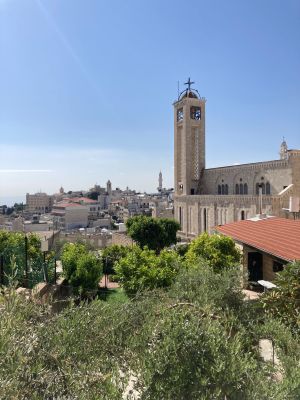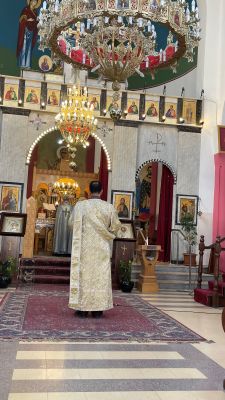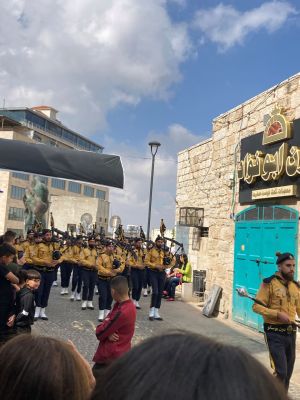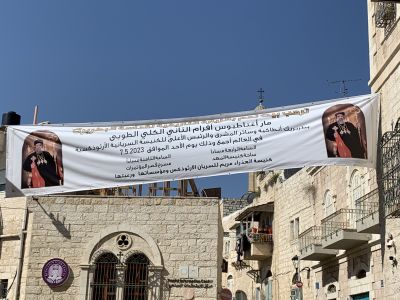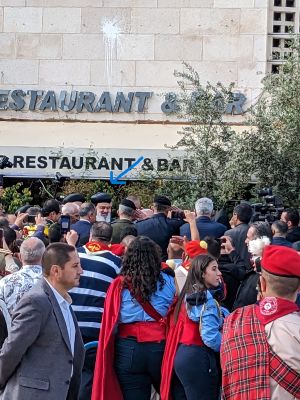“Melkite Worship and Sighting a Patriarch”
Phil Witmer-Rich
On the evening of Saturday May 6, the sound of four-part harmony could be heard throughout the halls of Bethlehem Bible College. Our group had been asked to perform a song at the Melkite Catholic Mass we were attending the following morning, and I was the de facto song leader. I found myself getting a little picky, switching people between voice parts and requesting more “vocal energy.” It would be a performance – might as well make it as good as possible! The songs came together quickly with only a few tries. When those voices echoed through the halls in harmony, I couldn’t help grinning from ear to ear.
We walked through the streets of Bethlehem to the church. It was beautiful, with icons and scenes from the Bible lining colorful walls. We stood and sat in accordance with the people around us, mostly listening to Arabic recitations by the priests and the whole congregation. The head priest processed through the aisles, shaking incense throughout. When the congregation sang, it was in unison. Written music was provided in our programs for a few parts, but mostly, the tunes seemed to just be known by the people. Our four-part harmony was a different enough sound that it felt a bit out of place when we stood to sing, but someone after the service told us we sang like angels.
Two parts of the service were in English: our singing, and a moment when the priest turned to speak with us Americans specifically. He spoke of the Palestinian struggle for liberation and encouraged us to speak out on their behalf and to do all we can to advocate for them once we got home. In the Holy Land, there is no “separation of church and state.” Being religious is a deeply political act. Because the Palestinians are oppressed and their land has been taken from them, speaking of and advocating for liberation is a religious, political, and even casual everyday activity.
The service was more ritualistic and formal than any service I had ever been to, and the ornate church initially seemed to give everything an air of higher importance; it was a bit intimidating. As the morning played out, it was clear that there was nothing to be intimidated about. The gathering was small, and the people (other than the priests) weren’t dressed especially formally. Children were involved in the service too; I’ll always remember a little girl holding a candle that was almost bigger than she was. She kept glancing backwards and grinning, and an older boy kept grabbing her shoulder and pushing her forward so she could keep up with the procession. After the service, we were warmly welcomed with Arabic coffee (strong, bitter coffee with cardamom) and a snack.
That afternoon, we went to a parade welcoming the Patriarch of the Syriac Orthodox church. Even though Christians make up only 2% of Palestine’s population, the streets of Bethlehem were lined with people in the same way fans of American sports teams might line the streets in celebration of a championship. Our group weaved through narrow streets and bagpipe ensembles. Along the way, I was struck by a little kid playing the trombone with some pizzazz. He had it propped up to the sky and was definitely putting some hip into his performance. As a fellow enthusiastic trombonist, I yelled my praises, and tried to catch his eye. Here was this kid whom I’ll never see again, whose skin color and religious sect and age and place in society and in the world are so drastically different from mine. But we share that carefree approach to playing the trombone, that deep passion and urge to garner attention and to bring energy. In a place so different from my home, I felt less alone.
Eventually came the moment we had all been waiting for: the appearance of the Syriac Patriarch, His Holiness Ignatius Aphrem II. His face was visible on a huge poster hanging high above the proceedings in Manger Square, but for a while we were trying to figure out which man he was. There were, it turned out, a great deal of church officials wearing religious vestments and sporting long gray beards milling about. When the Patriarch emerged, it was immediately clear who he was. Everyone crowded around him; it was like a swarm of paparazzi. He had two distinguishing features. The first were the two streaks of dark gray within his otherwise white beard (as visible on the poster). The second, to me, was… his smile. I had been expecting an old, dignified, almost deified man such as himself to have a serious look on his face, or at least a neutral expression. It would also be natural for someone swarmed like that, without any regard to personal space, to be somewhat annoyed or flustered, especially someone who deals with it all the time. But no; his face was lit up with a smile for as long as I saw him. He seemed so genuinely happy to be in and among the throng of people, and that happiness was so powerful. That night, when sharing about this experience with the group, I felt a smile plaster itself on my face; for a while, I just couldn’t let it go.





